Institutions
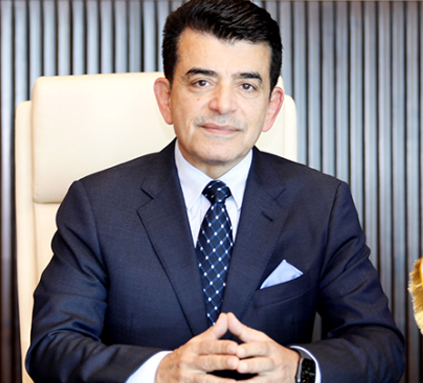 H.E. SALIM M. ALMALIK - 2024
H.E. SALIM M. ALMALIK - 2024
Director General of the Islamic World Educational, Scientific and Cultural Organization (ICESCO) - MOROCCO
For having been able to combine scientific culture, being a doctor at the service of those in need, concrete volunteering actions with the institutional role of Director General of ICESCO. Thanks to his leadership, ICESCO was able to find a balance between the 54 member countries in a difficult moment in the history of humanity, placing the immeasurable values of education, culture and scientific research at the center of its action.
Awarding Ceremony
Naples, 03 june 2024
 LAMPEDUSA ISLAND - 2020
LAMPEDUSA ISLAND - 2020
represented by the Mayor Salvatore Martello - ITALY
The Island of Lampedusa represents an example of integration and coexistence between men and women of different faiths, cultures, origins. The phenomenon of migration has made the inhabitants of Lampedusa protagonists of a "New Humanism" that Pope Francis himself, in his historic visit to Lampedusa on July 8, 2013, indicated as the only way to counter the "Globalization of indifference".
The Mayor Salvatore Martello represents the example of this humanism: in the meeting with Pope Francis on 10 September 2020 he gave the pontiff a cross made by a Lampedusan craftsman with the wood of the migrant boats and a t-shirt with the words "I am fisherman ".
Pope Francis recalled on this occasion the importance of remaining human by remaining united: “When even in an ocean two ideas that survive the waves meet, something extraordinary can be born”. In recognition of the capacity of reception, help and integration of the Lampedusans towards migrants, which always manifested itself and even in tragic situations, the juries of the "Mediterranean Prize", symbolically met on 3 October 2020 - anniversary of the Lampedusa massacre in which hundreds of migrants - awarded to the Island of Lampedusa, represented by the Mayor Salvatore Martello, the "MEDITERRANEAN AWARD 2020 INSTITUTIONS".
Awarding Ceremony
Naples, 08 october 20208
 DARIO FRANCESCHINI - 2018
DARIO FRANCESCHINI - 2018
Minister of Cultural Heritage and Activities and Tourism - ITALY
The award was assigned to Dario Franceschini for his forward-looking political and institutional vision aimed at enhancing the cultural heritage of the Italian Republic, among the most important in the world.
Its revolutionary action of transforming cultural sites into places of fruition with multidisciplinary activities has enabled the best enhancement by multiplying visitors from all parts of the world. In its four years of government, "significant results" have been obtained in the culture and tourism sector, thanks to a continuous and silent commitment made possible by the passion and competence that daily animate personnel and professionalism of Mibact.
Awarding Ceremony
Naples, 14 may 2018
 INTERMEDITERRANEAN COMMISSION (CIM) OF THE CPMR - 2017
INTERMEDITERRANEAN COMMISSION (CIM) OF THE CPMR - 2017
Conference of Peripheral Maritime Regions
The Intermediterranean Commission is one of the 6 geographic commissions of the Conference of Peripheral Maritime Regions which, as a whole, brings together some 160 regions from 25 EU and non-EU (Southern and Eastern Neighbourhood) countries.
The CPMR, together with its geographical commissions, represents almost 200 million citizens and works assiduously for a more harmonious development of the European territory and its catchment areas. It also has a think tank role and has been the voice of the regions before European, international and Euro-Mediterranean institutions since 1973.
Its Intermediterranean Commission, created in 1990, expresses the interests and needs shared by more than 40 regions from a dozen countries on both shores of the Mediterranean, and translates them into political and technical cooperation actions in favour of economic, social and territorial cohesion and thus of regional development, at basin level.
The IMC also brings the voice of the Mediterranean into the global framework of the CPMR by contributing to its reflections in favour of a strengthened European cohesion policy, to be consolidated as the main investment policy for tomorrow's Europe, but also to be used as an inspiration for shaping relations with the Southern Neighbourhood countries that can have a real impact on the territory.
Awarding Ceremony
Naples, 7 july 2017
 ELISABETH GUIGOU - 2016
ELISABETH GUIGOU - 2016
President of the Foreign Affairs Committee of the National Assembly of the French Republic and of the Anna Lindh Foundation
For more than 25 years committed to dialogue and peace in the Mediterranean and around the world, Ms Guigou has taken on prestigious roles and was also the first woman Minister of Justice under President Mitterrand in 1997. And she is still the first woman to be elected president of the Foreign Affairs Committee of the National Assembly, in 2012.
Awarding Ceremony
Naples, 9 september 2016
 MUSTAPHA BEN JAAFAR - 2014
MUSTAPHA BEN JAAFAR - 2014
President of the Parliamentary Assembly - TUNISIA
The prize is awarded to President Mustapha Ben Jaafar for his contribution to the construction of the Tunisian Constitutional Assembly and the new Tunisian Constitution, which legitimate social justice and public as well as individual liberty as paramount rights of the newly born Tunisian Democracy.
Awarding Ceremony
Rome, 28 february 2014
 JOSÉ MUJICA - 2013
JOSÉ MUJICA - 2013
President of Uruguay - URUGUAY
The President of Uruguay, José Mujica, is a virtuous example of dedication to the “Common Good” helping the most vulnerable and needy members of society. In a world that is increasingly mobbed by self–interest where every social, political and religious space abounds with “Love for Power”, he has been able to give a voice, sense and strength to the “Power of Love”. This means living humbly and showing through his acts that power need not change people, but can even reveal their deeper essence.
Awarding Ceremony
Napoli, 28 Maggio 2013
 MICHEL VAUZELLE - 2012
MICHEL VAUZELLE - 2012
President of the Provence Region Alpes Côte d'Azur - FRANCE
Former Spokesperson to the President of the French Republic François Mitterrand and Minister of Justice, he has dedicated his life to undertaking concrete partnership initiatives between the European Union and Mediterranean Countries, developing operational programmes that have contributed significantly to mutual understanding and exchanges among peoples on both shores despite the many difficulties encountered along the way.
As President of the PACA Region and the Alps-Mediterranean Euroregion, he has taken on a major role in development and integration policies.
Awarding Ceremony
Marseille, 5 april 2013
 SCUOLA MILITARE NUNZIATELLA - 2012
SCUOLA MILITARE NUNZIATELLA - 2012
ITALIE
For having prepared generations of young people for 'Life and Arms' for 225 years, constituting an intangible heritage of Humanity rooted in the history and life of the City of Naples and Italy.
The Nunziatella Military School represents an educational excellence in the Mediterranean and in the World that places Ethics and a system of Values at the heart of the training of young people, destined to play an essential role in the social life of the future.
Awarding Ceremony
Naples, 25 may 2012
 HABIB BEN YAHIA - 2012
HABIB BEN YAHIA - 2012
Secretary General of the Arab Maghreb Union (UMA) - TUNISIA
Former Minister of Foreign Affairs of Tunisia, he was one of the protagonists of the 1995 Barcelona Process. Under his leadership, the Arab Maghreb Union is committed to resolving tensions in the Maghreb section to achieve a climate of cooperation and understanding necessary for shared development.
Awarding Ceremony
Naples, 26 july 2012
 BENITA FERRERO-WALDNER - 2011
BENITA FERRERO-WALDNER - 2011
Former Minister of Foreign Affairs of the Republic of Austria and European Commissioner for External Relations - AUSTRIA
She has been committed to the process of dialogue and peace in the Euro-Mediterranean region since 1995. As one of the architects of the 'Barcelona Process', she has put every effort into concrete partnership initiatives between the European Union and the Mediterranean countries, developing operational programmes that - despite all the difficulties - have affected trust, mutual understanding and exchanges between the peoples of the two shores.
Awarding Ceremony
Naples, 20 may 2011
 GORGE ABELA - 2011
GORGE ABELA - 2011
President of the Republic of MALTA
For promoting cooperation between Europe and the Mediterranean by assigning the Republic of Malta a pivotal role and a space for the headquarters of international bodies set up to strengthen political, cultural and social dialogue between the two shores.
Awarding Ceremony
Naples, 20 may 2011
 ANGELA MERKEL - 2010
ANGELA MERKEL - 2010
German Chancellor - GERMANY
Expression of a democratic, pluralist vision in defence of human rights – matured through a long journey up to the fall of Berlin Wall – she has been able to put into practice juridical and political conditions of European standard, thus facilitating the unification of the two Germanies and taking a first rank role in the Euro-Mediterranean cooperation.
Awarding Ceremony
Naples, 13 june 2010
 ANIBAL CAVACO SILVA - 2009
ANIBAL CAVACO SILVA - 2009
President of the Republic of Portugal - PORTUGAL/span>
Continuing the great tradition of his Country, the President Aníbal Cavaco Silva always committed himself to reinforce solidarity and a proactive co-operation among all the Countries of the Mediterranean, to pursue development and to promote peace in the region.
Awarding Ceremony
Naples, 12 june 2009
 NICOLAS SARKOZY - 2008
NICOLAS SARKOZY - 2008
President of the French Republic - FRANCE
For his project of the Union for the Mediterranean. This action, pertaining to all the Countries converging on the Mediterranean and equally settled like the European Union, could be an initiative able to transform in a radical manner the inter-Mediterranean relationships. If politically there are not sufficient precedents, this idea has behind a thousand-year history of convergence expressed by the wide synthesis that succeeded in the Mediterranean. To give to this history a political conclusion is a big vision to which we cannot renounce.
Awarding Ceremony
Naples, 28 june 2010
 RENÉ VAN DER LINDEN - 2007
RENÉ VAN DER LINDEN - 2007
President of the Parliamentary Assembly of the Council of Europe
René van der Linden contributed with his political action to the spreading of the values of dialogue in the Greater Mediterranean area. At first as President of European Popular Party, then as President of the Parliamentary Assembly of the Council of Europe, he encouraged the Euro Mediterranean Politics, especially in order to defend human rights, democracy and gender equality.
Awarding Ceremony
Naples, 30 march 2007
 AMR MOUSSA - 2006
AMR MOUSSA - 2006
Secretary General of the LEAGUE OF ARAB STATES
This award is granted for his contribution in promoting dialogue between the Western and Arab-Islamic worlds, first as Minister of Foreign Affairs of the Arab Republic of Egypt, and then as Secretary General of the League of Arab States. His merit was that to get transformation process of the League of Arab States in a Pan-Arab Parliamentary Assembly democratically representative of those States.
Awarding Ceremony
Tunisi, 31 january 2006
 RECEP TAYYIP ERGOGAN - 2005
RECEP TAYYIP ERGOGAN - 2005
Prime Minister of Republic of - TURKEY
A personality unanimously respected for his integrity and commitment to democracy and pluralism with a vision of politics matured through a long journey and reflection. Recep Tayyip Erdoğan, as Mayor of Istanbul, was able to introduce modern criteria in the administration of the town. Then, as Prime Minister, he has consistently promoted the political and cultural dialogue between Turkey and Europe. This award, meant to recognize the great progress of a Country whose culture is deeply rooted in the East with a long and profound relationship with the West, wishes that Europe be willing to testify, by a new enlargement, the end of a century-old confrontation between States of Christian tradition and States of Muslim tradition.
Awarding Ceremony
Naples, 2 september 2005
 GIANNI LETTA - 2004
GIANNI LETTA - 2004
Undersecretary of State at the Italian Prime Ministry - ITALY
His “good policy” founded on respect of Constitution and consideration of the adversary allows to include Gianni Letta in the list of Statesmen. His commitment in favour of solidarity, youth and valorisation of cultural, artistic, architectural, environmental, archaeological heritage of the Mediterranean is unanimously recognized and is an example for those who want to be involved in partnership actions.
Awarding Ceremony
Naples, 5 november 2004
 PAT COX e ABDELWAHED RADI - 2003
PAT COX e ABDELWAHED RADI - 2003
Co-Presidents of the Euro-Mediterranean Parliamentary Assembly
The President of the European Parliament Pat Cox and the President of the Moroccan Parliament Abdelwahed Radi were the authors of the patient work that led to the creation in Naples, on 2nd December 2003, of the Euro‑Mediterranean Parliamentary Assembly, transforming the Forum instituted after the Barcelona Process. In acknowledgement of their essential action for democratic development in the Euro-Mediterranean area, the ad hoc Commission of Fondazione Mediterraneo granted the Mediterranean Award for Institutions 2003 to Presidents Cox and Radi.
Awarding Ceremony
Atene, 23 march 2004
 ANTONIO BASSOLINO - 2002
ANTONIO BASSOLINO - 2002
President of the Regione Campania - ITALY
As Governor of the Region, he instituted a Department for the Relations with the Mediterranean Countries. Symbol and warning of a policy that, being aware of the turn of the millennium, has realized that Naples, Campania and Italy itself have no future outside the tissue where along centuries has been constructed, among clashes and encounters, exchanges and unions, a great and specific Euro- Mediterranean unity, to which the whole Europe should turn again so as to reinforce and develop the values on which it has constructed its own identity and resulting from the syntheses occurred in the Mediterranean..
Awarding Ceremony
Naples, 4 january 2002




 AL ARABIYA - 2015
AL ARABIYA - 2015 in memory of SIMONE CAMILLI - 2014
in memory of SIMONE CAMILLI - 2014  ALESSIO ROMENZI - 2013
ALESSIO ROMENZI - 2013 MIKA YAMAMOTO - 2012
MIKA YAMAMOTO - 2012 PINO BLASI - 2012
PINO BLASI - 2012 PAOLO MIELI - 2011
PAOLO MIELI - 2011 CNN - 2011
CNN - 2011 AL-JAZEERA - 2010
AL-JAZEERA - 2010 LA VANGUARDIA - 2010
LA VANGUARDIA - 2010 EL PAIS - 2009
EL PAIS - 2009 IL DENARO - 2008
IL DENARO - 2008 IBRAHIM EL MOALLEM - 2007
IBRAHIM EL MOALLEM - 2007 AL-HAYAT - 2006
AL-HAYAT - 2006 LE MONDE DIPLOMATIQUE - 2005
LE MONDE DIPLOMATIQUE - 2005 ANSAMED - 2005
ANSAMED - 2005 AL-BAYANE - 2004
AL-BAYANE - 2004 "MEDITERRANEO" - 2003
"MEDITERRANEO" - 2003 VITTORIO NISTICÒ - 2002
VITTORIO NISTICÒ - 2002 EL MUNDO - 2002
EL MUNDO - 2002 CORRIERE DELLA SERA - 2002
CORRIERE DELLA SERA - 2002 IGOR MAN - 2000
IGOR MAN - 2000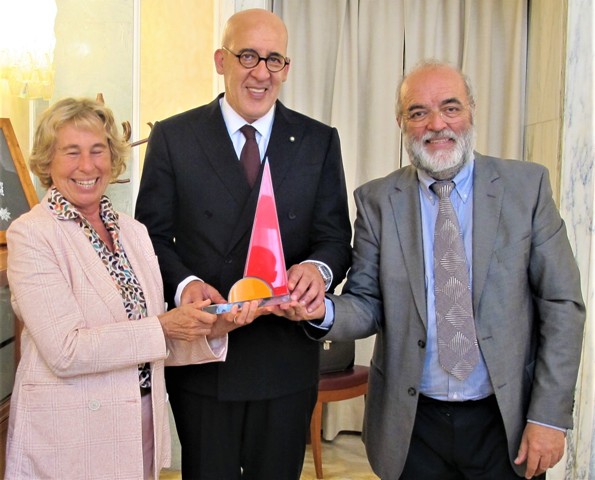 MOEZ EDDINE SINAOUI - 2022
MOEZ EDDINE SINAOUI - 2022 MOHAMED M. ABOU EL ENEIN - 2018
MOHAMED M. ABOU EL ENEIN - 2018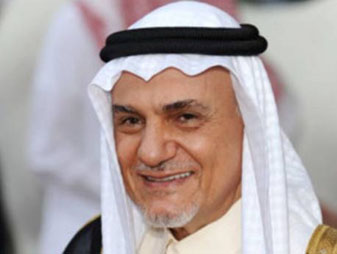 SAR PRINCE TURKI AL FAISAL AL SAUD - 2015
SAR PRINCE TURKI AL FAISAL AL SAUD - 2015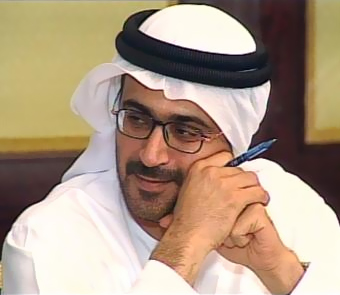 Dr. JAMAL SANAD AL SUWAIDI - 2014
Dr. JAMAL SANAD AL SUWAIDI - 2014 FELICIO ANGRISANO - 2014
FELICIO ANGRISANO - 2014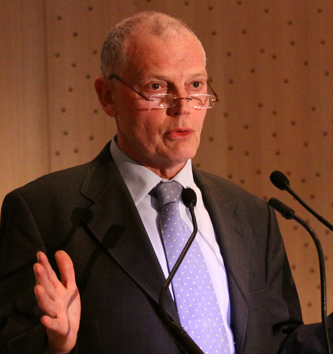 SERGE TELLE - 2014
SERGE TELLE - 2014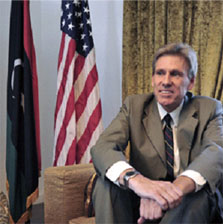 in memory of CHRIS STEVENS - 2013
in memory of CHRIS STEVENS - 2013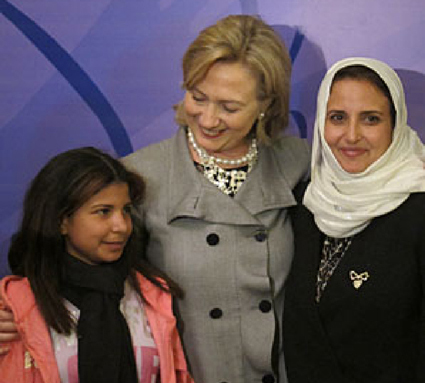 HILLARY RODHAM CLINTON - 2012
HILLARY RODHAM CLINTON - 2012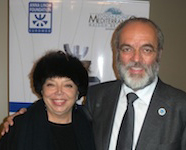 LEILA SHAHID - 2011
LEILA SHAHID - 2011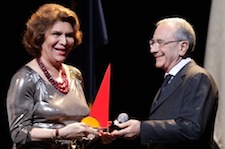 S.A.R. WIJDAN AL-HASHEMI - 2010
S.A.R. WIJDAN AL-HASHEMI - 2010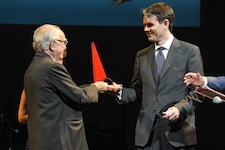 CARL BILDT - 2010
CARL BILDT - 2010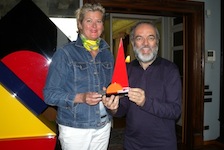 URSULA PLASSNIK - 2009
URSULA PLASSNIK - 2009 MASSIMO D'ALEMA - 2008
MASSIMO D'ALEMA - 2008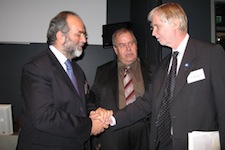 ERKKI TUOMIOJA - 2007
ERKKI TUOMIOJA - 2007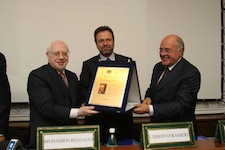 MOHAMED BEDJAOUI - 2006
MOHAMED BEDJAOUI - 2006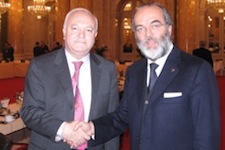 MIGUEL ANGEL MORATINOS - 2004
MIGUEL ANGEL MORATINOS - 2004 PAOLO PUCCI DI BENISICHI - 2002/2003
PAOLO PUCCI DI BENISICHI - 2002/2003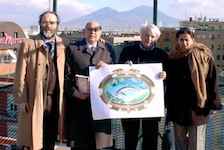 NEHAD ABDEL LATIF - 2002
NEHAD ABDEL LATIF - 2002